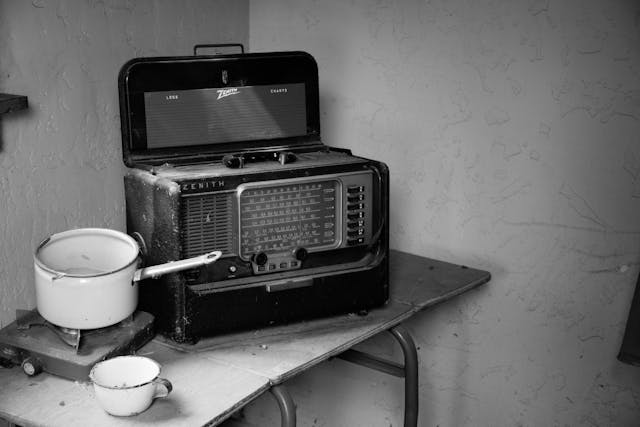
What is pirate radio? A pirate radio station is a radio station that broadcasts a signal in an area controlled by a government without having a license from that government.
Pirate radio stations began in the 1940s, but they probably hit their peak in the 1960s. They brought music and attitudes to the multitudes that were not allowed on the government-controlled radio networks. They fueled, and were fueled by, the changing attitudes in society that were becoming predominant after World War 2. Most of the pirate radio stations and most of the DJs who broadcast on them went on to become mainstream broadcasters, but that wouldn’t have happened without the influence of the pirate radio stations.
The need for pirate radio stations came about because the governments of countries controlled all of the airwaves and could shut them down whenever they wished. This control started pretty much as soon as public broadcasting became a thing. Radio waves were first discovered in the 1880s by Heinrich Rudolf Hertz. Ten years later, Guglielmo Marconi had worked out how to send electronic signals over radio waves. This allowed wireless communication over distances of up to 50 km. He could only send Morse code, but in 1900, a Canadian called Reginald A. Fessenden worked out how to send voices over radio waves and he sent the first audio radio waves. Radio broadcasting rapidly improved from there. In the early days, most of the people sending radio signals and building detectors did it as a hobby. But pretty, soon the governments arrived to take control and they nationalized the air frequencies. The main reason for that was defense.
The navy in the UK and in the USA very quickly realized the possibilities of radio signaling. Radios were still far to big to be used by the army, but it would be possible to build a transmitter and a receiver on a ship. Being able to transmit signals to another ship over distance would give that navy a huge advantage. The problem was, because the airwaves weren’t regulated, anybody with a homebuilt radio transmitter could transmit on any frequency and thus get in the way of naval transmissions. For this reason, before and during World War 1, civilians were forbidden from transmitting on a frequency without a license.
After the war, the necessity of keeping the airwaves free for the military lessened, but there was still a need to parcel out the frequencies because you couldn’t have two radio broadcasters using the same frequencies. These licenses weren’t easy to get but the number of radio stations grew, more so in the USA than in the UK due to its sheer size. Radio in the UK was a monopoly controlled by the BBC until the 1950s. The BBC was technically free of government control, but it was still forced to answer to the government and that meant it was not allowed to play a lot of modern or risqué music. This wasn’t considered a problem until society began to change when the children born after World War 2 started to grow up. In the USA as well, radio stations were not really allowed to play a lot of songs, and frustration built up.
This frustration led to the first pirate radio stations in the 1960s. Throughout the 1950s and into the 1960s, there were many new musical genres appearing and a lot of these songs, the singers, and the types of music were thought to be anti-establishment or bad for the youth. That meant radios wouldn’t play them. As with any industry, if there is a need for a product, somebody will step up to supply that product. And that is what pirate radio stations did. They set up radio stations outside the jurisdiction of the country they were broadcasting to and started their own radio programs.
There were two ways that pirate radio stations operated. The first was by setting up in a neutral country and broadcasting a signal that could be picked up in the home country. An example of this is Radio Luxembourg. The radio station was obviously based in the country of Luxembourg, which is a small country between Belgium, France, and Germany. It broadcast in English and the signal could be picked up in the UK. They played songs that DJs in the UK were not permitted to play and the station became very popular. The second way was by setting up the radio station on a ship. Several radio stations did this. One example is Radio Caroline, which was set up on a ship in international waters, just far enough outside the UK’s waters to be safe. Then they broadcast a signal into the UK. The UK government couldn’t do anything about the ships because they were in international waters. The USA has a similar situation. Some radio stations broadcast from boats just inside international waters and Mexico, on the southern border of the USA, broadcast a signal that was strong enough to be picked up in America. The UK tried to stop the pirate radio stations by making listening to unauthorized pirate radio stations illegal, but nobody was ever prosecuted for it. Many of the DJs that worked at these pirate radio stations became very famous and after the main radio stations became less constricted, many of them moved to mainland radio. And this is what I learned today.
Sources
https://www.nps.gov/people/reginaldfessenden.htm
https://www.bbc.com/historyofthebbc/100-voices/radio-reinvented/the-pirates
https://en.wikipedia.org/wiki/History_of_broadcasting
https://en.wikipedia.org/wiki/Invention_of_radio
https://en.wikipedia.org/wiki/Pirate_radio
https://en.wikipedia.org/wiki/Pirate_radio_in_the_United_Kingdom
Photo by Brett Sayles: https://www.pexels.com/photo/grayscale-photo-of-vintage-radio-beside-stove-with-cooking-pot-1213922/
